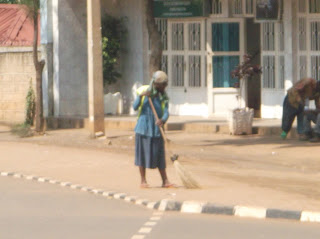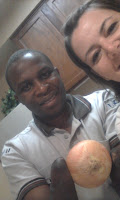 |
| These beauties came to visit during the service. |
I couldn’t help but notice the differences too. There wasn’t just one choir—there were five! About a third of the church was involved in the choirs, and they each had a turn at leading praise. It was everything you’d expect: vibrant rich harmonies and a clapping rhythm I could never seem to catch. By the time the fifth choir took its turn, I could really feel the heat from the tin roof overhead, but as if on cue, a cooling rain came to pitter-pat our relief.
There were several opportunities to tithe, during which steady streams of people would walk to the front to give—at least one lady (Dan noticed) went forward several times. The one crying baby I could see was alerting his mother that he was ready to be untied from her back, a sight that amazes me no less each time I see it. The babies and toddlers are tied on so neatly, so securely, so contentedly that you’d never even know they were there except for the little feet sticking out in the front or the little head peeking out in the back (if not covered).
The main difference, of course, was that the entire service was in Kinyarwanda. (Well, except for the very brief interval when they asked their American guest to come to the front and say a few words.) Yet I had no problem understanding the passion of the message. The pastor spoke fervently about “changing your testimony” (as was whispered to me), using the examples of Daniel reading the writing on the wall and Joseph interpreting the pharaoh’s dreams. I read the verses in my English Bible as he preached and pleaded in Kinyarwanda. And while I couldn’t literally understand very much of the service, there’s just something universal about the power of praise and the reverence of prayer.
As the pastor brought the service to a close (about three hours in), everyone turned to look at the three Americans seated toward the back. I immediately wondered what cultural faux pas we had committed, but Frederick quickly explained: the pastor was asking our family to carry greetings from their church in Gisenyi back to ours, at home in the United States and wherever we may travel.
So, from the beautiful, worshipful church in Gisenyi, Rwanda, I send you all the greetings of universal Love.












